 What Is a License Plate Reader and Can Police Track You Using It?
What Is a License Plate Reader and Can Police Track You Using It?
Table of Contents
- Michigan License Plates
- Michigan License Plate Design and Formats
- Michigan Vanity License Plate
- Most Popular Michigan Special Plate Numbers
- Michigan License Plate Lookup
- What Do I Need to Get a License Plate in Michigan?
- Differences Between a Passenger License Plate and a Commercial License Plate in Michigan?
- How to Renew License Plate in Michigan
- How to Transfer a License Plate in Michigan
- Michigan License Plate Lookup Frequently Asked Questions (FAQ)
 Michigan License Plates
Michigan License Plates
Michigan license plates are a vital component of the state's transportation system. These metallic plates are issued by the Michigan Secretary of State (via the Department of State) to vehicles registered in Michigan. They display a combination of letters and numbers unique to each vehicle. This unique alpha-numeric combination, known as a license plate number, serves several purposes, the primary ones being to identify each vehicle that operates in Michigan and ensure that its registered owners comply with the state's vehicle code. They also allow law enforcement to identify cars implicated in crimes or incidents and enforce traffic regulations.
The Michigan Department of State offers vehicle owners various types of license plates to suit different preferences and needs. These include:
- Standard Plates: these are regular license plates issued to vehicle registrants. Standard plates are available in several options for cars, motorcycles, and trailers.
- Special Cause Fundraising Plates: these plates allow the vehicle owner to express their support for a particular cause. The Department of State donates a portion of the fees it collects for these plates to the cause displayed on them.
- University Fundraising Plates: vehicle owners can request these plates to show their affiliation with a particular university. A part of the fees collected by the Department of State for these plates is donated to the specific university.
- Military and Veteran Plates: these are issued to eligible military service members, veterans, and family members of these individuals.
- Special Organization Plates: these are issued to select public service and nonprofit fraternal organization members.
- Historical and Authentic Plates: these may be issued for vehicles at least 26 years old, owned solely as a collector's item, and used only for events such as historical club activities, parades, and car shows.
- Disability Plates: these are issued to registrants with a disability.
- Industry Plates: industry plates are assigned to farm, gross vehicle weight (GVW), log, fleet, and other commercial vehicles.
- Collector Plates: collector plates look like regular plates but are for display purposes only. They are typically purchased as souvenirs and sample plates.
Michigan license plates are mandatory for all motor vehicles operating in the state and must be displayed at the rear of the vehicle, except for trucks or road tractors, where they have to be displayed at the front. These plates must be securely attached in a horizontal position at least 12 inches from the ground and be clearly visible at all times. The Department of State typically issues an expiration tab (sticker) along with the license plate, which must be fixed on the upper-right corner of the plate or the lower-right corner for motorcycles and standard Winter-Water Wonderland plates.
 Michigan License Plate Design and Formats
Michigan License Plate Design and Formats
Michigan license plates are rectangular, reflectorized aluminum plates with a unique alpha-numeric combination (the license plate number) located centrally on each plate. Since April 2013, standard plates have utilized a design consisting of a seven-character plate number embossed in blue over a white plate background, with a blue "Pure Michigan" logo screened at the top of the plate and a wavy blue band screened at the bottom. "michigan.org" is screened in white in the center of this wavy blue band.
However, the Water Wonderland and Water-Winter Wonderland standard plate options have green and blue backgrounds, respectively, while the Mackinac Bridge Plate design consists of this bridge over a white and yellow background. Likewise, even though other plate types typically follow the standard Pure Michigan white background design, they may include additional features or designs related to organizations, universities, or causes, depending on the specific plate type. They may also have plate numbers with less than seven characters.
Here are some Michigan license plate designs:
Standard License Plates – Pure Michigan, Water-Winter Wonderland, Mackinac Bridge:
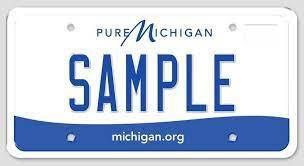
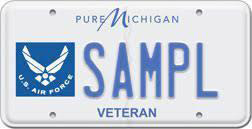
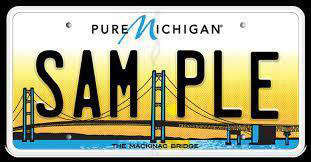
University Fundraising Plate: Military and Veteran Plates:
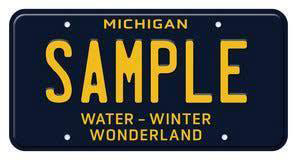
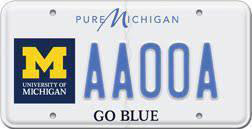
* Source: Michigan Department of State
 Michigan Vanity License Plate
Michigan Vanity License Plate
Michigan vanity plates are personalized license plates that allow vehicle owners to customize their plate numbers in line with specific guidelines and limitations set by the Michigan Department of State. Some of these guidelines include:
- A maximum of six or seven characters is allowed, depending on the plate type
- Only letters and numbers may be used. Symbols are not allowed
- The letter "O" will be substituted for the number "0"
- Spaces may be used but will count as one character
- Four repeating characters are not allowed
The Department of State offers a Personalized Plate Lookup platform that you can use to check the availability of your desired personalization and subsequently place an order. It is advisable to order your vanity plate as soon as you confirm its availability to avoid someone else applying for the same configuration. Requests for vanity plates can also be submitted in person; however, you must first schedule an office visit with the department.
You will be required to pay a non-refundable personalized service fee of $30 for your vanity plate in addition to regular vehicle registration/license plate issuance fees. You can also request a second decorative plate for an extra $5; however, this plate cannot be used on your vehicle. Be aware that the Secretary of State has the authority to deny your application and will refuse any request for license plates with letters, numbers, or a combination that could be offensive or inappropriate. This includes words or symbols related to swearing, sex, body parts, drugs, illegal activities, and hate speech. Vanity plates are also considered state property and may be recalled anytime if the department determines that a previously issued plate violates or conflicts with its standards.
 Most Popular Michigan Special Plate Numbers
Most Popular Michigan Special Plate Numbers
The Michigan Department of State offers a diverse range of license plate designs and themes that cater to the interests and passions of vehicle owners while supporting important causes and commemorating the state's unique attributes. The top license plate themes and designs in Michigan are:
- Children Trust Michigan plates
- Lighthouse Preservation plates
- Mackinac Bridge plates
- Michigan State University plates
- Patriotic (Proud To Be American) plates
- Spectacular Peninsulas plates
- University of Michigan plates
- Water-Winter Wonderland plates
- Western Michigan University plates
- Wildlife Habitat plates
 Michigan License Plate Lookup
Michigan License Plate Lookup
License plate lookup is a process that allows individuals to obtain information about vehicles based on the vehicle's license plate number. This information typically includes the vehicle's make, model, year, registration status and inspection/repair records. People often need license plate lookup services to gain insight into vehicles they wish to buy. Law enforcement agencies, private investigators, and legal professionals also utilize license plate lookups to investigate crimes, track down individuals associated with specific vehicles, and conduct background checks.
There are several options available for accessing vehicle-related information in Michigan. One option is through the Michigan Department of State. You can request access to vehicle information stored with this department, either online or by completing and mailing a Non-Account & Individual Record Request (BDVR-154) form to
Michigan Department of StateRecord Sales Section
7064 Crowner Drive
Lansing, MI 48918-1502
Vehicle record searches with the Department of State typically cost $15 per search – this fee will be charged regardless of whether the requested information is available or not. Be aware that you must have a valid, permissible reason to request vehicle records containing another individual's personal information without their authorization. Per Section 257.208c of the Michigan Vehicle Code, this kind of information can only be requested for specific reasons by certain authorized parties, including law enforcement officers, licensed private investigators, insurance, and towing companies. If you request vehicle records containing personal information you are not permitted to access, this information will either be redacted or concealed, or your request will be rejected.
Alternatively, RecordsFinder and other similar third-party websites and databases offer reverse license plate search services that provide comprehensive vehicle information, which comply with federal and state privacy regulations, all for a nominal fee.
 What Do I Need to Get a License Plate in Michigan?
What Do I Need to Get a License Plate in Michigan?
The Michigan Department of State handles the state's license plate issuance process, and you must title and register your vehicle with this department to obtain these plates. Many dealerships handle this process for customers; however, confirm this with your dealer if you bought your vehicle through a dealership. On the other hand, if you purchased your vehicle through a private party or just relocated to Michigan with an out-of-state vehicle, you will need to complete the titling and registration process in person. New residents are required to complete the titling and registration process immediately after they establish residency – the state does not offer a grace period. Likewise, residents who purchase a vehicle through a private party must title and register it within 15 days.
To initiate the titling and registration process, you must first schedule an office visit with the department. On the date of your appointment, you will be required to go along with the following documents:
- The original title of the vehicle. This document must be signed by both you and the seller
- Your previous state's vehicle registration (where applicable)
- An Odometer Mileage Statement (Form BVDR-108). This is only required if there is no provision for this on the vehicle's title document
- Proof of a valid Michigan No-Fault insurance policy
- Your Michigan driver's license or ID
- A signed statement from your loan provider (where applicable)
Fees vary based on the vehicle type, sale value, and the circumstances surrounding the sale. These costs typically include a title fee, a plate transfer fee (where applicable), and a sales tax. Nonetheless, the Department of State provides a registration fee calculator that you can use to estimate your titling and registration fees before going for your appointment. You will be issued a standard license plate after titling and registering your vehicle. You may subsequently request another plate type once this is done.
 Differences Between a Passenger License Plate and a Commercial License Plate in Michigan?
Differences Between a Passenger License Plate and a Commercial License Plate in Michigan?
Passenger plates are the standard license plates for personal-use vehicles like cars and SUVs. In contrast, commercial plates are license plates issued for commercial vehicles, like trucks and trailers. Per the Michigan Vehicle Code, commercial vehicles are motor vehicles used to transport passengers for money or to carry goods or materials. This includes vehicles designed to pull other vehicles but not meant to carry loads independently. However, limousines operated by limo drivers, taxicabs operated by cab drivers, and personal vehicles operated by transportation network drivers are excluded from this categorization.
The Michigan Department of State issues two types of plates for these commercial vehicles – a regular commercial plate and an elected gross vehicle weight (GVW) commercial plate.
Regular commercial plates are assigned to:
- Vehicles used for transporting passengers for hire (like taxis, buses, and limousines)
- Company-owned pickups and vans up to 8,000 pounds
- Vehicles up to 8,000 pounds used commercially for transporting goods or merchandise (such as stake trucks, tanks, dumps, and utilities), including commercially used passenger vehicles
- Ambulances and hearses
On the other hand, GVW commercial plates are required for
- Trucks weighing over 8,000 pounds (when empty) used commercially
- All semi-tractors used commercially
- Trucks weighing 8,000 pounds or less (when empty) towing a trailer or another vehicle for commercial purposes, excluding pickups and vans under 8,001 lbs. towing a trailer
The table below provides primary distinctions between passenger and commercial license plates in Michigan:
| Features | Passenger License Plate | Commercial License Plate |
|---|---|---|
| Vehicle Use | Personal use |
|
| Plate number arrangement |
Seven-character alpha-numeric combination for standard "Pure Michigan" license plates: (ABC 1234) * other plate types may have less than seven characters |
Same as passenger plates; however, the serial format may differ: (AB 12345), (AB12345) |
| Design & Color |
White plate background, blue embossed plate number, with a blue "Pure Michigan" logo screened in blue at the top of the plate and a wavy blue band screened at the bottom with "michigan.org" screened in white in the center (of the band) * other plate types may feature additional organization-specific emblems and logos or different background colors and designs. |
Same as standard passenger plates * GVW commercial plates may not feature a wavy blue band with "michigan.org" at the bottom of the plate |
| Use Limitations | Intended for personal use, non-commercial purposes | Used for business activities such as transportation or delivery |
| Requirements for obtaining |
* the Department of State may request additional documentation depending on specific circumstances |
Same as passenger license plates; however, additional documents may be required based on the vehicle's weight class and intended use |
 How to Renew License Plate in Michigan
How to Renew License Plate in Michigan
You have to renew your vehicle's registration and license plates every one or two years – vehicle owners can choose their preferred validity period during their initial registration and subsequent renewals. License plates typically expire on your birthday or the next business day if your birthday falls on the weekend or a holiday. You can renew your plates up to six months before your registration expiration date; nonetheless, the Michigan Department of State usually sends out a renewal notice at least a month before this date.
License plate renewals can be initiated online through the department's Online Services platform or in person by utilizing one of its several self-service stations or scheduling an office visit with the department. You can also renew your license plates by mailing your renewal notice, along with necessary supporting documents and fees (these will be indicated in the notice) to
Michigan Department of StateInternal Services Section
7064 Crowner Drive
Lansing, MI 48918
In the event that you lost your renewal notice or never received one, you can still utilize the mail renewal option by sending a letter with the following details:
- Your full name (including middle name)
- Michigan driver's license or ID number
- License plate number
- Permanent address and a different mailing address if needed
- Phone number
- A money order or check payable to the State of Michigan for your renewal fee
Send this information, payment, and proof of valid Michigan No-Fault vehicle insurance policy (if required) to the above mailing address. You can determine your renewal amount online using the department's Renewal Fee Calculator service. Factors like your vehicle type, plate type, and your preferred renewal option typically determine these fees.
In-person renewals are typically processed instantly. You can also print your new expiration tab immediately when you renew via a self-service station, while it may take up to 14 days for your updated registration to be sent to your address. This timeframe also applies to renewals done online or via mail.
However, if you haven't received your tabs after 30 days, create or log into your online Secretary of State account or contact the department at (888) 767-6424 to verify the address on your vehicle registration. If the address is incorrect, you can update it and order a new set of tabs for a $5 fee. If the address is correct, you can request a set of replacement tabs by calling any Secretary of State office.
 How to Transfer a License Plate in Michigan
How to Transfer a License Plate in Michigan
You can transfer your Michigan license plate from an old vehicle to a new one you own or to a car you sold to an immediate family member, such as:
- Your spouse
- A parent (including step-parents or mothers/fathers-in-law)
- Your child (including stepchildren or daughters/sons-in-law)
- Your sibling (including step-siblings, half-siblings, or sisters/brothers-in-law)
- A grandparent
- A grandchild (including grandchild-in-law)
- A legal ward
- A legally appointed guardian
License plate transfers can only be done in person at a Department of State branch office. Note that you have to schedule an office visit first. You will need the following documents for your appointment:
- The current vehicle registration for the plate you wish to transfer
- The title to the vehicle that the plate will be transferred to. Note that titles that have been altered or modified will be rejected
- A valid Michigan driver's license or ID
The plate transfer fee varies based on whether the receiving vehicle was bought from an immediate family member or a private party or if the plates are being transferred from your old car to a new one. Additional charges may also be accrued if you're replacing or renewing the plate during the transfer or if you're transferring the plate to a vehicle with a higher MSRP. To this end, the Department of State provides plate transferand renewal fee calculators that you can use to estimate the cost of transferring your license plates from one vehicle to another.
 Michigan License Plate Lookup Frequently Asked Questions (FAQ)
Michigan License Plate Lookup Frequently Asked Questions (FAQ)
Can I Get a Replacement for My Lost License Plate in Michigan?
The Michigan Department of State typically replaces vehicle owners' license plates every 10 years at no additional cost to them. However, if your license plate gets lost or damaged during its 10-year lifespan, you must order a replacement from the department. These replacements can be requested online, in person (by either scheduling an office visit with the department or utilizing one of its self-service stations), or by mailing an appropriate license plate order form to:
Michigan Department of StateInternal Services Section
7064 Crowner Drive
Lansing, MI 48918-8264
Be aware that only a vehicle owner, a family member residing at the same address, or someone designated by the owner through an Appointment of Agent Form can order a replacement license plate. Plate replacement fees start as low as $5 for standard license plates, but actual costs vary by plate type and your chosen replacement method. The department may waive this fee for damaged plates if it determines that a manufacturing defect caused the damage; however, you will have to take the plate to one of its offices in person for an inspection.
What Do Police See When They Run Your License Plates in Michigan?
When law enforcement officials run Michigan license plates, they access information about the linked vehicle, like:
- The vehicle's make, model, year, and color
- Its registered owner's name and address
- Its registration and insurance status
- Outstanding violations
- Stolen vehicle alerts
- Open warrants and investigations associated with the vehicle and its registered owner
What Is the Penalty for Driving with an Expired License Plate in Michigan?
Michigan license plates have to be renewed annually or biennially, depending on your chosen registration validity period during your registration. These plates expire on your birthday and can be renewed up to six months before this date. Be aware that the Department of State does not offer a renewal grace period; however, if your birthday falls on a weekend or legal holiday, you can renew it on the next business day without any penalty.
Driving your vehicle with an expired license plate is considered a misdemeanor, and you can be fined up to $100, jailed for up to 90 days, or face a fine and jail time combination for doing this. The Department of State will also charge you an added $10 fee when you renew your plates after expiration.
Do I Need to Return License Plates in Michigan?
You do not need to return license plates to the Michigan Department of State. However, the department advises vehicle owners who wish to dispose of their old plates to do so by either cutting the plate in half or bending off a corner. Doing this reduces the chances of the plates being used by someone else for criminal activities.
Can I Keep My Michigan License Plate If I Move to Another State?
You do not need to return your Michigan license plate if you move out of state, even if you title and register your vehicle in your new state of residence. However, it would be best to destroy the plate before disposing of it to prevent misuse. You can also ignore any Michigan registration renewal notice you get after registering your vehicle in another state.
What Size Are License Plates in Michigan?
In Michigan, license plates for automobiles and trailers typically measure 12 inches in width and 6 inches in height, while motorcycle plates are smaller, measuring 7 inches by 4 inches.
How Long Can You Drive with Temporary License Plates in Michigan?
The Michigan Department of State does not issue temporary license plates. However, if you only use your vehicles occasionally or are away from the country for long periods, you may buy a 30-day or 60-day temporary vehicle registration permit from the department. To obtain this permit, you must schedule an office visit with the department, provide proof of vehicle ownership and a valid Michigan No-Fault insurance, and pay the requested fees.
Be aware that the Department of State reserves the right to deny requests for temporary vehicle registration permits. It is also against the law to drive with an expired vehicle registration in Michigan, whether temporary or permanent. This offense is punishable by fines of up to $100, jail time of up to 90 days, or a combination of both.
What Are the Steps to Renew a License Plate in Michigan?
You can renew your Michigan license plate by taking these steps:
- Confirm your renewal date. This is usually your birthday (or the next business day for birthdays that fall on holidays or weekends). The Department of State allows vehicle registrants to renew their plates up to six months before they expire
- Select your preferred renewal method. The department offers four options – online, self-service stations, in-person office visits, and mail renewals
- Submit required documents and pay renewal fees
- Get your updated registration and new expiration tab
- Affix the new expiration tab to your license plate
What Do I Do If My License Plate Is Lost or Stolen in Michigan?
If you lose your Michigan license plate, you can request a replacement from the Department of State through any of the following methods:
- Online
- Utilizing a self-service station
- Scheduling a visit with a department branch office near you
- Completing and mailing an order form for your desired plate type to the department
However, if you think that your plate was stolen, the department advises you to report it to your local police department or sheriff's office right away. They will enter a message into the Law Enforcement Information Network to let officers know that the plate was reported stolen.
Your plate type will determine the cost of replacing lost or stolen plates. You can also designate someone to order these plates on your behalf by giving them a signed Appointment of Agent Form.




